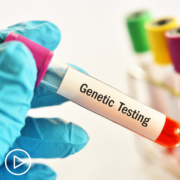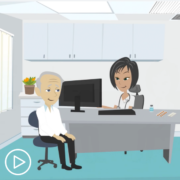Addressing Socioeconomic Disparities in Thyroid Cancer Care: Impact and Mitigation Strategies
Addressing Socioeconomic Disparities in Thyroid Cancer Care: Impact and Mitigation Strategies from Patient Empowerment Network on Vimeo.
What are socioeconomic disparities in thyroid cancer care, and how can these disparities be mitigated? Expert Dr. Megan Haymart from the University of Michigan discusses the impact of socioeconomic status and education status and shares actionable patient advice for optimal care.
[ACT]IVATION TIP
“…make sure that you’re seeing high volume physicians who see a lot of patients with thyroid cancer. This is for both the surgeons and the endocrinologists, because we know that outcomes are better when individuals see high volume physicians.”
See More from [ACT]IVATED Thyroid Cancer
Related Resources:

|

Advancing Thyroid Cancer Care: Tailored Treatment and Patient Involvement |

Personalized Treatment Approaches in Advanced Thyroid Cancer Management |
Transcript:
Lisa Hatfield:
Dr. Haymart, how does socioeconomic status impact the diagnosis and treatment outcomes of thyroid cancer patients? And what strategies can be employed to mitigate these effects?
Dr. Megan Haymart:
So there’s strong data that socioeconomic status does have an impact on diagnosis and treatment. And so we know that individuals’ access to insurance makes a difference. We know that patients can be at risk for different levels of financial hardship. So a fee of $5,000 means a lot, different things based on how much reserve individuals have. And so we know that this is a real issue.
And then related to socioeconomic status, we also know that there can be differences based on education level as well. And so in order for patients to mitigate these differences, I think it’s complicated. Like I think really there needs to be systematic changes. So it doesn’t all rest on the patient, but for patients, my activation tip would be, one, ask the questions.
And so, if you feel that you’re not getting the answers that you want, don’t be afraid to get a second opinion. And my other activation tip for this question would be to make sure that you’re seeing high volume physicians who see a lot of patients with thyroid cancer. This is for both the surgeons and the endocrinologists, because we know that outcomes are better when individuals see high volume physicians.
And there’s strong data for thyroid cancer and other cancers as well, that sometimes what’s happening is individuals who are lower socioeconomic status or a minority race or ethnicity are sometimes clustering at low volume hospitals. And so they may not be getting the best care because of where they’re going.
And so I think it’s very important to advocate for yourself and don’t be afraid to look around. And if the center that’s closest to you isn’t the best center for thyroid cancer, and if there’s a better one that’s 30 minutes away, and you’re capable of getting there, I would encourage you to go.










